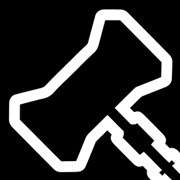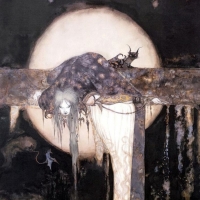Memories from Afar (collaborative)
Hey y'all, I've been experimenting with world building for a while, concentrating on creating a world with its laws, history, aesthetic, and as it turns out, MTG is a great way to explore lore and bring these ideas and stories closer to reality.
I've created this thread to talk about the lore of the cards I create (and other lore in general lol), but I also think it would be awesome to turn this individual project into a cooperative one, so don't hesitate to create cards based on lore, ask questions, start discussions or even suggest lore (depending on the enthusiasm, there is a possibility to create different timelines).
I also have to warn you, this project is leftwing at its core (as you'll see later), and while you obviously don't have to agree with the ideas I put forward, just remember not to be a jerk (a great amount of the lore is less political for those who would like to explore non political aspects). With that, I'll start posting information in the comments.
I've created this thread to talk about the lore of the cards I create (and other lore in general lol), but I also think it would be awesome to turn this individual project into a cooperative one, so don't hesitate to create cards based on lore, ask questions, start discussions or even suggest lore (depending on the enthusiasm, there is a possibility to create different timelines).
I also have to warn you, this project is leftwing at its core (as you'll see later), and while you obviously don't have to agree with the ideas I put forward, just remember not to be a jerk (a great amount of the lore is less political for those who would like to explore non political aspects). With that, I'll start posting information in the comments.
 MTG Cardsmith Community Forums
MTG Cardsmith Community Forums
Comments
This universe is an alternate version of our universe, identical in all things but one: magic exists. For this reason, I thought I would start by explaining how magic works.
Magic is at its core (although it is often not regarded as such) the actualisation of a potential of X (X being any object, say an apple) by the subject. On a philosophical level (yeah, get used to it, I'm also a philosophy nerd), we could compare this to a form of subjective idealism (which all magic is bound to be at some level), with one distinction however: reality is material and "One" (materialism, monism). An object's potentiality can be determined by a conscious being (as long as they understand the object's potentiality and the process that links it to its predecessor), but it doesn't have to be.
This, however, is not how magic is going to be understood right away, and we are going to see why by looking at what is necessary for magic to be discovered and used. Magic is not something that can be grasped intuitively, and while individuals may have a particular prowess for it, anyone who wants to use magic needs one thing above all: knowledge. By understanding the true nature of objects, the laws that regulate their functioning, relations and more, you are able to go beyond what an object is at the moment and see what it could be, and how it could become that potential being, which are the fundamentals to how magic works.
As such, magic is nothing more than an extension of our field of influence on the external world (it is only external from your subjective pov), or, as I prefer to see it and as many key characters will realize, an expression of matter through the subject, the act which brings potentiality into reality, the future into the present.
Magic thus needs means of observation, writing to record and accumulate information (as well as space to store it), and people with time to study enough to have a sufficient grasp on it. Political implications aside, as we'll get to that later, this means that magic developed hand to hand with science, and was infact considered as an aspect of science, applied science (although, as we'll see later, not many people originally knew about magic). While this is technically not wrong, this amongst other things lead the "official" (state authorized) study of magic to become only a fraction of what it could be.
The greatest discoveries in magic were made by independent actors from all walks of life who were at some point exposed to magic and didn't instantly get killed (see politics comment). They often went into hiding, either forming a circle with like-minded mages or becoming hermits dedicated to their craft, growing mad as they no longer have any anchor to keep their work from consuming them. However, the non affiliation of these mages also meant they weren't bound by the limitations of a weary state. Whereas the discovering of magic was the result of an organized effort grounded in a social context that restricted its study (seriously, at least start reading the comment on politics), some individuals were now rediscovering magic through their own means, forcefully unbound of the limitations of the official study of magic by the fact that they are prohibited from it and are almost always removed from society.
A form of natural selection appears: those who don't manage to escape the forces of the State get snuffed out, while those that remain get to keep sharpening their skills, making them more powerful and more successful at escaping the forces of the state. Eventually, they themselves sometimes start to act as a force of repression by eliminating potential threats before they become too dangerous, an effort which is also fought by others. Being able to extend their lifespan and gifted with a plethora of abilities, these mages come to live for entire generations.
The oldest mages (some can be about 4 thousand years old) are beings of power matched by few, oftentimes only mages that are older than them or individuals with an exceptional innate gift for magic (Einstein would have made an amazing mage). At this point, the unofficial study of magic has by far surpassed the "legal" study of magic, but we'll get to that some other time. The important thing here is that this process led to a great number of different "schools" of magic (sometimes only composed of one member), leading magic to extend beyond the artificial limits that were set for it. Despite this, magic is still shrouded in secrecy and completely unavailable to the masses, who aren't even aware of its existence (honestly you're better of this way, good luck surviving otherwise).
From a lore standpoint, it must be considered that while key characters have a distinct personality, goals and motivations, most of them are only vessels through which different potentialities of matter may express themselves, a process which becomes more and more true as a mage continues practicing their craft. While the scale of these potentialities may vary, most can be dissected and essentialized as one underlying idea, a frequence of being, a perfect version (potentiality) of the universe: a God Engine.
Different characters and factions serve different God Engines, some more consciously than other, leading to a world with complex dynamics between groups literally serving as vessels of a potential future, a battle of the God Engines.
That's pretty much all I have on magic for now, more coming soon!
At least that's how I'm understanding the magic system right now. I'm only midway through the passage.
Hope this answered your question!
I don't really care what a person believes in, as long as it isn't overtly hostile to other people. As long as this story is good, I'll listen in and hopefully learn something new about world building!
Your approach to world-building through MTG card creation is fantastic! Combining custom card design with rich lore is a great way to bring a unique setting to life. Since you're open to cooperative storytelling, have you considered structuring your world around factions or major historical events that players can expand upon?
Additionally, the idea of different timelines could be a great mechanic—perhaps through alternate history cards or "what if" scenarios. You could even introduce a mechanic like Chrono Divergence, where cards interact differently based on the chosen timeline.
Would love to hear more about the core themes of your world beyond its political foundation. What aesthetic influences are shaping it? Are you incorporating any mythological or sci-fi elements?